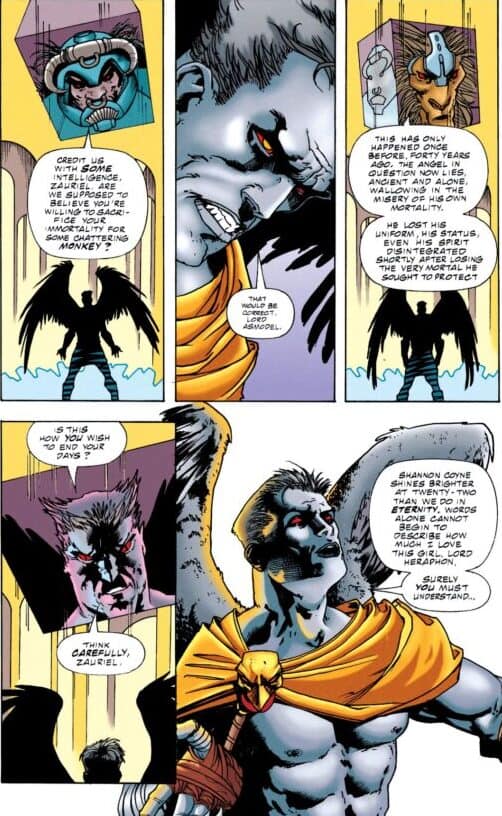***Contains Spoilers***
JLA: Paradise Lost is a three-issue storyline from JLA (1997) written by Mark Millar, focusing on the Justice League as they attempt to deal with a rebellion in Heaven. After the angels of Heaven overthrow their leader, the archangel Zauriel must seek the League’s help to restore balance. The plot delves into the nature of divine rule, power struggles, and the intricacies of a celestial war, while showcasing the League’s efforts to stop a potentially catastrophic shift in the cosmic order.
What I liked about JLA: Paradise Lost was the refreshing origin story for Zauriel. Millar gives this character depth and purpose, showing the complexity of his existence as both an angel and a being striving for redemption. Zauriel’s emotional journey is compelling as he navigates his newfound role among the mortal heroes. His inclusion added an interesting dynamic to the League, and his backstory was one of the more interesting aspects of the storyline. The visuals by Millar are solid, with strong representations of the celestial and divine battles. The depiction of Heaven’s forces and their clash with the Justice League gives the story a unique scale.
However, there were several elements that kept Paradise Lost from being truly great. The pacing of the story felt uneven, with long stretches of exposition and dialogue-heavy scenes that detracted from the action. The plot seemed overly reliant on philosophical and theological debates, which while interesting, became somewhat cumbersome and slowed the overall momentum. Some of the Justice League members, particularly Batman and Wonder Woman, felt underutilized, with their roles reduced to mere bystanders in what should have been a high-stakes cosmic event. Additionally, the antagonist’s motivations seemed somewhat vague, and their personal stakes were never fully fleshed out, which undermined the tension and stakes of the narrative.
The art, while competent, occasionally felt stiff, especially during moments that demanded more fluidity or emotional intensity. Ariel Olivetti’s style is effective but not as dynamic as it could have been for a story involving gods and angels. There were times when the artwork felt more like it was serving the dialogue than elevating the narrative, which dampened the overall impact of the plot.

In conclusion, JLA: Paradise Lost is an ambitious attempt to explore divine themes within the Justice League context, but it ultimately falls short of its potential. While Zauriel’s origin story was a highlight, and the premise had promise, the story struggled with pacing, character use, and a lack of emotional resonance. It’s a decent read for those interested in the more esoteric, philosophical side of the DC universe, but it lacks the lasting impact to make me want to revisit it anytime soon. 2 Stars – a fun one-time read.
Feature Image JLA: Paradise Lost #3 cover art by Ariel Olivetti
Keep NewToComics.com running with a donation or shopping with through our affiliates—your support helps maintain the site and continue guiding new readers into the world of comics!


